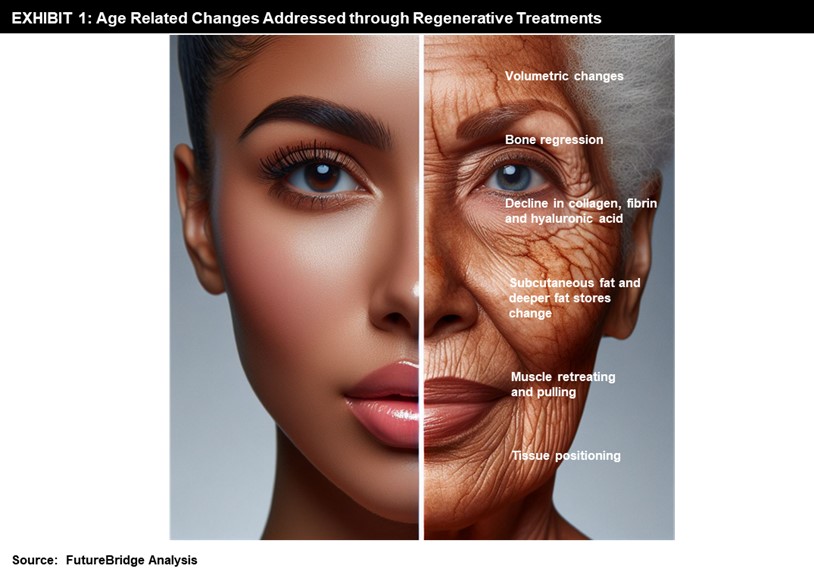Innovative Solutions for Skin Longevity: The Future of Regenerative Beauty
The purpose of this article is to explore the transformative impact of regenerative beauty technologies on skincare. It highlights the scientific advancements and innovative treatments that promote the skin’s natural regenerative processes, offering holistic and long-term solutions for anti-aging and overall skin health. The article delves into various cutting-edge formulations, topical treatments, and non-invasive procedures, while also examining the strategies of major companies and future trends in the industry. Ultimately, it emphasizes the shift towards a comprehensive approach to beauty that enhances the skin’s vitality and youthfulness.
Introduction
Aging brings a wealth of life experiences, but it also introduces physiological and aesthetic changes that can leave us feeling less vibrant and looking like a tired version of ourselves. Fortunately, groundbreaking advances in regenerative technologies now offer the ability to turn back the clock, repairing, restoring, and regenerating tissue with remarkable precision. These cutting-edge developments represent a revolutionary evolution in aesthetic treatments, providing renewed hope for those striving to maintain a youthful, radiant appearance. Embrace the future of beauty with innovative solutions that promise not just to enhance, but to rejuvenate and revitalize your skin. Regenerative beauty represents a holistic approach to skincare and beauty that focuses on promoting the body’s natural ability to repair and rejuvenate itself. The beauty industry is seeing a paradigm shift towards this approach, emphasizing the enhancement of the skin’s natural regenerative processes rather than relying solely on surface-level treatments. At the forefront of this movement are technological advancements that offer innovative solutions for promoting skin longevity. From advanced formulations to cutting-edge treatments, these technologies represent a new frontier in skincare science.
Regenerative beauty is revolutionizing skincare by incorporating cutting-edge products formulated with powerful ingredients like antioxidants, vitamins, and peptides that deeply nourish and support skin health. This holistic approach goes beyond topical treatments, emphasizing the importance of lifestyle factors such as a balanced diet, effective stress management, adequate sleep, and regular exercise—all essential for promoting overall skin health and regeneration. The ultimate goal of regenerative beauty is to enhance long-term skin vitality by harnessing the skin’s natural regenerative processes, offering a comprehensive pathway to a youthful, radiant complexion.
Technological Solutions for Regenerative Beauty
A cornerstone of regenerative beauty is the development of advanced skincare formulations leveraging scientific research to incorporate potent ingredients that nourish and support skin health.
- Advanced Skincare Formulations
- Peptides stimulate collagen production, reducing the appearance of fine lines and wrinkles.
- Growth factors promote cellular renewal, improving skin texture and elasticity.
- Antioxidants combat free radicals, promote collagen synthesis, reduce inflammation, enhance skin repair and regeneration.
- Platelet-rich plasma (PRP), derived from a patient’s blood, is used in facial rejuvenation to combat skin aging and enhance fat graft retention. Studies show PRP improves skin texture and elasticity, reduces wrinkles, and normalizes pigmentation.
- Exosomes are tiny extracellular vesicles rich in growth factors, proteins, and nucleic acids. In aesthetic treatments, exosomes enhance natural healing processes, promoting collagen synthesis, reducing fine lines, and improving skin texture and tone for firmer, smoother, and more radiant skin.
- Stem cells restore and revitalize skin by differentiating into various cell types and regenerating damaged tissue. They increase cell proliferation, stimulate collagen and elastic fiber production, inhibit metalloproteinase activation, and protect against UV-induced senescence.
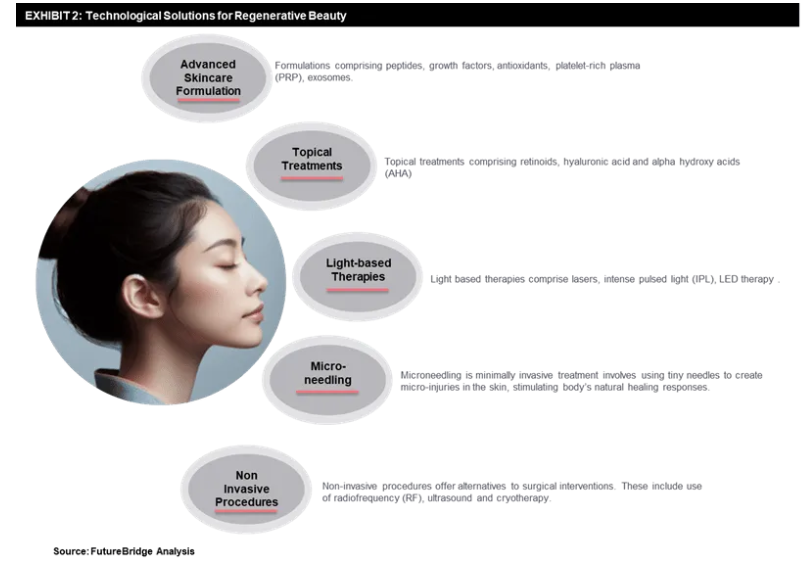

- Topical Treatments
Technological advancements have introduced innovative topical treatments that target specific skin concerns like:
-
- Retinoids stimulate cell turnover, reduce signs of aging and promote a smoother complexion.
- Hyaluronic acid attracts and retains moisture, hydrating the skin from within.
- Alpha hydroxy acids (AHAs) exfoliate dead skin cells, revealing fresher more youthful-looking skin.
These topical treatments offer effective solutions for improving skin texture, tone, and overall appearance.
- Light-Based Therapies
Light-based therapies are powerful tools for skin rejuvenation. Lasers, intense pulsed light (IPL), and LED therapy are the technologies used in these treatments.
-
- Laser resurfacing targets specific skin imperfections, such as wrinkles, scars, and pigmentation irregularities, by stimulating collagen production and promoting skin renewal.
- IPL therapy targets vascular and pigmented lesions, improving overall skin tone and texture.
- LED therapy uses different wavelengths of light to address various skin concerns, including acne, inflammation, and signs of aging.
These non-invasive treatments offer safe and effective solutions for achieving youthful-looking skin.
- Microneedling
Microneedling is an innovative procedure promoting skin regeneration. It uses tiny needles to create controlled micro-injuries, triggering collagen production and skin renewal. Effective for wrinkles, scars, and stretch marks, it improves skin texture and tone with minimal downtime and impressive results, making it a popular choice for skin rejuvenation.
- Non-Invasive Procedures
Advancements in technology have also led to non-invasive procedures that offer alternatives to surgical interventions.
-
- Radiofrequency (RF) therapy delivers heat energy deep into the skin, stimulating collagen production and tightening loose skin.
- Ultrasound therapy targets the deeper layers of the skin, promoting collagen synthesis and improving skin elasticity.
- Cryotherapy uses freezing temperatures to destroy damaged skin cells, leading to smoother, more youthful-looking skin.
These non-invasive procedures offer safe and effective solutions for addressing various signs of aging without the need for surgery or extensive downtime.
Major Players and Their Strategies in the Regenerative Beauty Sector
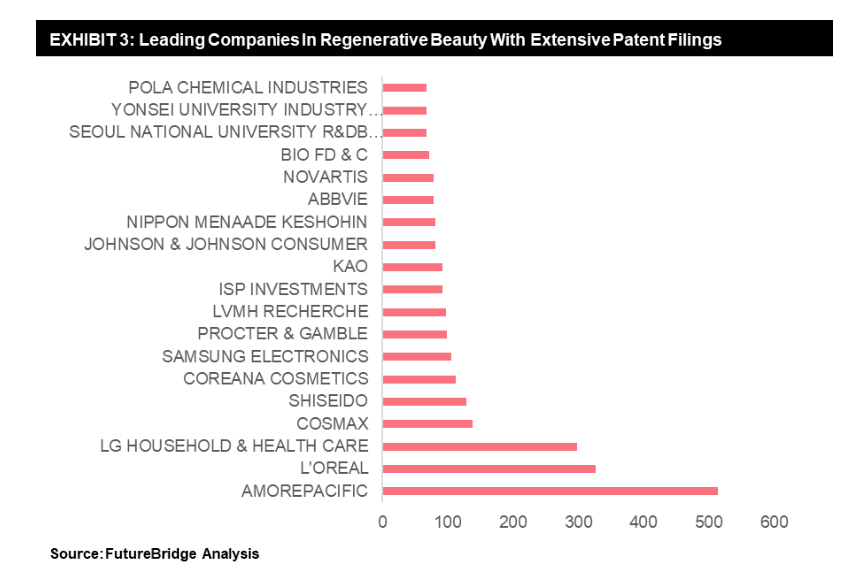

The listed companies are prominent players in the regenerative beauty space, each contributing through research, development, and products aimed at enhancing skin health and beauty through innovative technologies. AMOREPACIFIC and SHISEIDO are known for their advanced skincare formulations, incorporating regenerative properties to improve skin elasticity and texture. L’OREAL and PROCTER & GAMBLE focus on developing regenerative skincare products that promote skin renewal and anti-aging benefits. Companies like LG HOUSEHOLD & HEALTH CARE and SAMSUNG ELECTRONICS contribute through advanced biotechnology and skincare devices, enhancing the effectiveness of regenerative treatments. Others like KAO and JOHNSON & JOHNSON CONSUMER invest in research collaborations with universities to innovate regenerative beauty solutions. Overall, these companies are at the forefront of integrating regenerative science into beauty products, aiming to redefine skincare by harnessing the potential of cellular regeneration and biotechnological advancements.
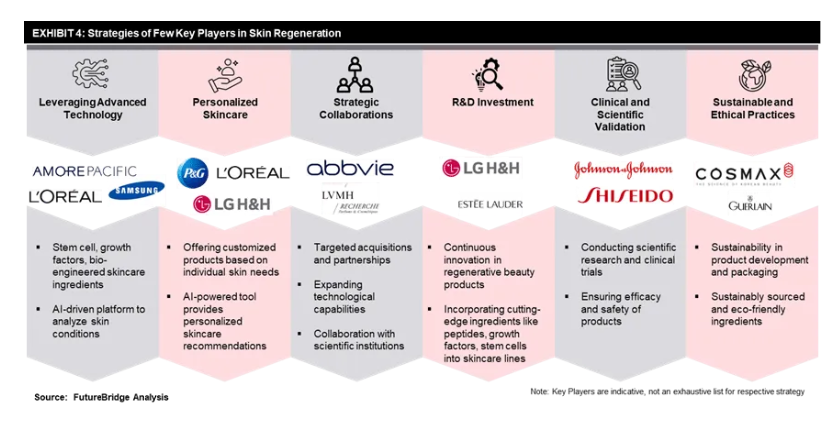

Advantages of Regenerative Beauty
Regenerative beauty offers a multitude of benefits compared to traditional aesthetic treatments. These benefits encompass both immediate and long-term improvements in skin health and appearance. Few key advantages are shared below:
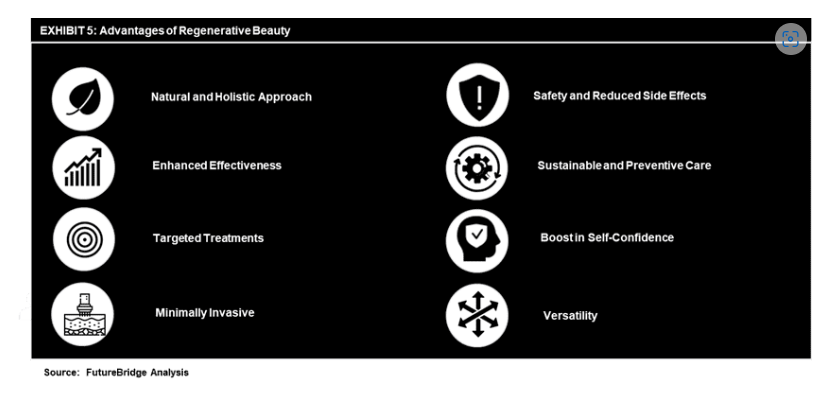

Market Growth and Trends
The market for regenerative beauty is rapidly expanding as consumers increasingly seek treatments that offer natural, long-term solutions to aging. This surge in demand is driven by several factors, including heightened awareness of skincare’s importance, the growing popularity of minimally invasive procedures, and advancements in technology that provide more effective and safer options.
The global market for regenerative beauty treatments is projected to experience significant growth over the next decade. According to market research, the regenerative medicine sector, including aesthetic applications, is expected to reach billions of dollars in value. Key trends fueling this growth include:
- Increasing Consumer Awareness: With more information readily available, consumers are becoming better informed about the benefits of regenerative treatments. They are actively seeking products and procedures that offer more than superficial improvements.
- Technological Advancements: Innovations in biotechnology, nanotechnology, and genetic engineering are leading to the development of more effective treatments. Products like exosome therapy, PRP, and advanced stem cell treatments are becoming more accessible and popular.
- Preference for Non-Invasive Procedures: Modern consumers favor non-invasive and minimally invasive treatments due to their shorter recovery times and lower risk profiles. Procedures such as microneedling, RF therapy, and light-based treatments are seeing increased adoption.
- Holistic Approach: The trend towards a holistic approach to beauty and wellness is also driving market growth. Consumers are looking for treatments that not only improve their appearance but also promote overall health and well-being.
Future Trends and Innovations in Regenerative Beauty
The field of regenerative beauty is rapidly evolving, driven by scientific advancements and a growing demand for natural, effective skincare solutions. Here are some emerging trends and innovations shaping its future:
Advanced Stem Cell Therapies
- Personalized Stem Cell Treatments: Future treatments may involve harvesting and utilizing an individual’s own stem cells to create personalized skincare solutions, enhancing compatibility and effectiveness.
- Allogeneic Stem Cell Products: Research is focusing on developing stem cell products derived from donors, which can be standardized and made widely available for various aesthetic applications.
Gene Editing and CRISPR Technology
- Gene Therapy for Skin Rejuvenation: Innovations in gene editing, such as CRISPR technology, hold promise for correcting genetic factors that contribute to aging, potentially reversing signs of aging at a molecular level.
- Targeting Aging Pathways: Researchers are exploring ways to manipulate specific genetic pathways associated with aging, aiming to slow down or even reverse the aging process.
Nanotechnology and Nanoparticles
- Nano fat Grafting: The use of nano fat, which involves processing fat to extract regenerative cells, is showing promise for improving skin quality and treating scars and wrinkles.
- Nanoparticle Delivery Systems: Advances in nanotechnology are enabling the creation of ultra-small particles that can deliver active ingredients more effectively to deeper layers of the skin.
Bioprinting and 3D Printing
- 3D Printed Skin Grafts: Bioprinting technology is being explored for creating skin grafts that can be used to repair damaged skin, offering potential applications in both medical and cosmetic fields.
- Customizable Skincare Solutions: 3D printing could allow for the creation of personalized skincare products tailored to an individual’s unique skin structure and needs.
Regenerative Peptides and Proteins
- Next-Generation Peptides: Research is focused on developing new peptides that can more effectively stimulate collagen production and skin repair.
- Protein-Based Treatments: Innovative treatments using naturally occurring proteins that enhance cell regeneration and repair are being developed to improve skin health and appearance.
Smart Skincare Devices
- AI-Powered Diagnostic Tools: Artificial intelligence is being integrated into skincare devices to provide personalized skincare regimens based on real-time skin analysis.
- Smart Delivery Systems: Devices that use microcurrent, ultrasound, or other technologies to enhance the penetration and effectiveness of skincare products are becoming more advanced.
Holistic and Integrative Approaches
- Integrating Wellness and Skincare: Future trends emphasize the connection between overall wellness and skin health, incorporating nutrition, mental health, and lifestyle factors into skincare routines.
- Customized Holistic Regimens: Skincare regimens that are tailored to individual needs, integrating both topical treatments and lifestyle recommendations, are gaining popularity.
Futuristic Foresight
Looking ahead, the future of regenerative beauty is poised to become even more groundbreaking with the integration of emerging technologies and holistic health approaches. Innovations in personalized stem cell therapies, gene editing with CRISPR, and the application of nanotechnology are set to revolutionize skincare, offering highly customized and effective solutions. Bioprinting and 3D printing promise to create bespoke skin grafts and personalized skincare products, while advancements in AI-powered diagnostic tools will enable real-time, tailored skincare regimens. The fusion of wellness and skincare will become increasingly important, emphasizing the role of nutrition, mental health, and lifestyle in achieving optimal skin health. As these cutting-edge developments unfold, regenerative beauty will not only address the signs of aging but will also enhance overall well-being, heralding a new era in aesthetic science and holistic health.
Partner with us to achieve market leadership with bespoke life science solutions and advanced skincare technologies tailored to elevate your brand.



